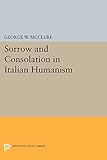Sorrow and Consolation in Italian Humanism / George W. McClure.
Material type: TextSeries: Princeton Legacy Library ; 1100Publisher: Princeton, NJ : Princeton University Press, [2014]Copyright date: ©1990Edition: Course BookDescription: 1 online resource (324 p.)Content type:
TextSeries: Princeton Legacy Library ; 1100Publisher: Princeton, NJ : Princeton University Press, [2014]Copyright date: ©1990Edition: Course BookDescription: 1 online resource (324 p.)Content type: - 9780691606699
- 9781400861200
- 152.4
- B780.G74 -- M23 1991eb
- online - DeGruyter
- Issued also in print.
| Item type | Current library | Call number | URL | Status | Notes | Barcode | |
|---|---|---|---|---|---|---|---|
 eBook
eBook
|
Biblioteca "Angelicum" Pont. Univ. S.Tommaso d'Aquino Nuvola online | online - DeGruyter (Browse shelf(Opens below)) | Online access | Not for loan (Accesso limitato) | Accesso per gli utenti autorizzati / Access for authorized users | (dgr)9781400861200 |
Browsing Biblioteca "Angelicum" Pont. Univ. S.Tommaso d'Aquino shelves, Shelving location: Nuvola online Close shelf browser (Hides shelf browser)

|

|

|

|

|

|

|
||
| online - DeGruyter The 1002nd Night / | online - DeGruyter History as a Visual Art in the Twelfth-Century Renaissance / | online - DeGruyter Muslims Under Latin Rule, 1100-1300 / | online - DeGruyter Sorrow and Consolation in Italian Humanism / | online - DeGruyter From Provinces into Nations : Demographic Integration in Western Europe, 1870-1960 / | online - DeGruyter Becoming a French Aristocrat : The Education of the Court Nobility, 1580-1715 / | online - DeGruyter Reforming Rural Russia : State, Local Society, and National Politics, 1855-1914 / |
Frontmatter -- CONTENTS -- PREFACE -- ABBREVIATIONS -- INTRODUCTION. THE CLASSICAL AND CHRISTIAN TRADITIONS -- CHAPTER 1. Petrarch as Self-Consoler: The Secretum -- CHAPTER 2. Petrarch as Public Consoler: The Letters -- CHAPTER 3. Petrarch as Universal Consoler: The De remediis utriusque fortune -- CHAPTER 4. Consolation and Community: Coluccio Salutati as Friend and Comforter -- CHAPTER 5. The Art of Mourning: Autobiographical Writings on the Loss of a Son -- CHAPTER 6. The Science of Consoling: A Litde-Known Clerical Manual of Consolation -- CHAPTER 7. Grief and Melancholy in Medicean Florence: Marsilio Ficino and the Platonic Regimen -- CONCLUSION. The Italian Renaissance and Beyond -- NOTES -- SELECT BIBLIOGRAPHY -- INDEX
restricted access online access with authorization star
http://purl.org/coar/access_right/c_16ec
George McClure offers here a far-reaching analysis of the role of consolation in Italian Renaissance culture, showing how the humanists' interest in despair, and their effort to open up this realm in both social and personal terms, signaled a shift toward a heightened secularization in European thought. Analyzing works by fourteenth-and fifteenth-century writers, from Petrarch to Marsilio Ficino, McClure examines the treatment of such problems as bereavement, fear of death, illness, despair, and misfortune. These writers, who evinced a belief in the legitimacy of secular sadness, tried to forge a wisdom that in their view dealt more realistically with the art of living and dying than did the disputations of scholastic philosophy and theology.Arguing that consolatory concerns helped spur the revival of classical schools of psychological thought, McClure reveals that the humanists sought comfort from once-neglected troves of Stoic, Peripatetic, Epicurean, Platonic, and Christian thought. He contends that the humanists' pursuit of solace and their duty as consolers provided not only a forum but perhaps also an incentive for the articulation of prominent Renaissance themes concerning immortality, the dignity of man, and the sanctity of worldly endeavor.Originally published in 1990.The Princeton Legacy Library uses the latest print-on-demand technology to again make available previously out-of-print books from the distinguished backlist of Princeton University Press. These editions preserve the original texts of these important books while presenting them in durable paperback and hardcover editions. The goal of the Princeton Legacy Library is to vastly increase access to the rich scholarly heritage found in the thousands of books published by Princeton University Press since its founding in 1905.
Issued also in print.
Mode of access: Internet via World Wide Web.
In English.
Description based on online resource; title from PDF title page (publisher's Web site, viewed 30. Aug 2021)


